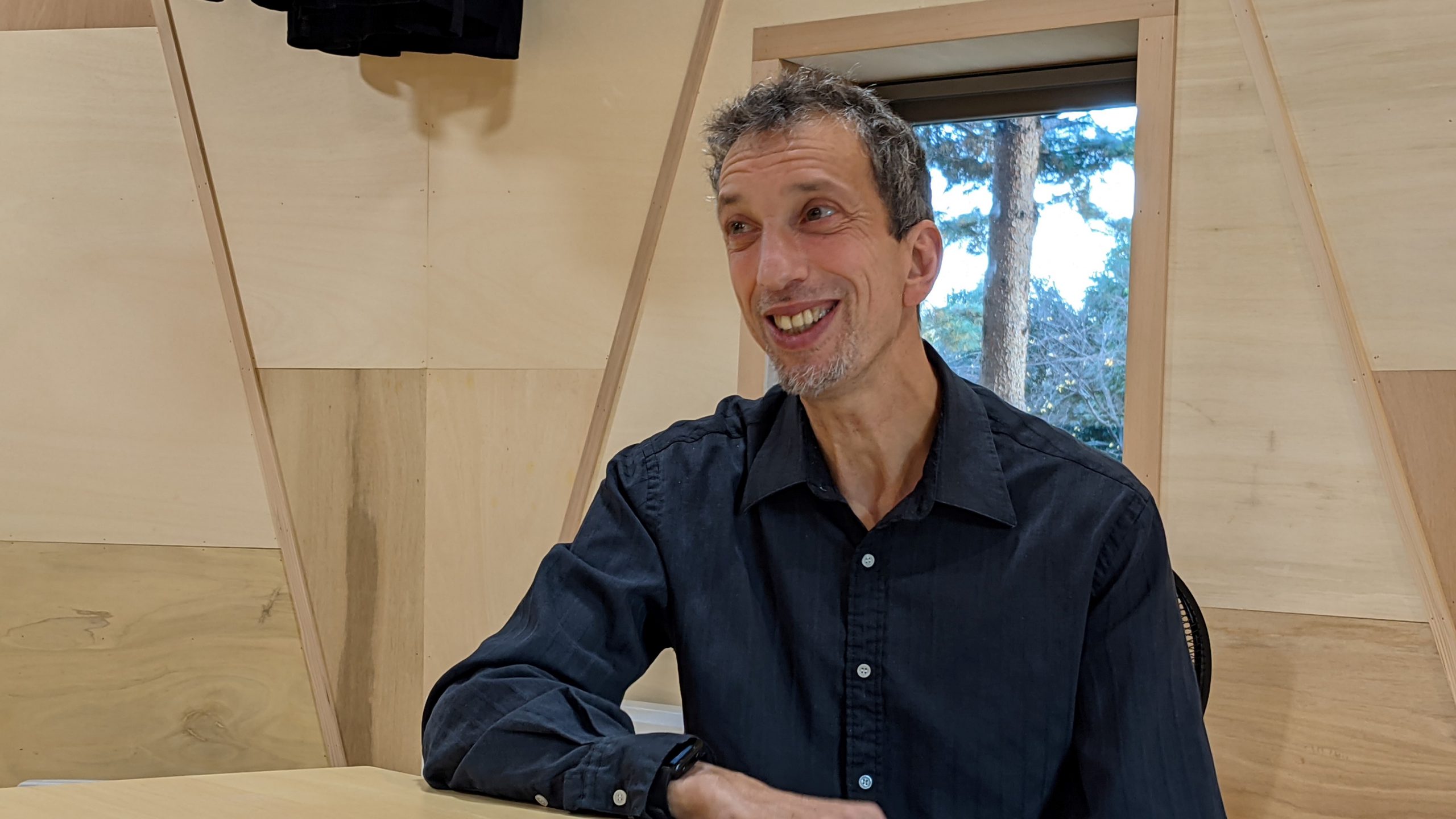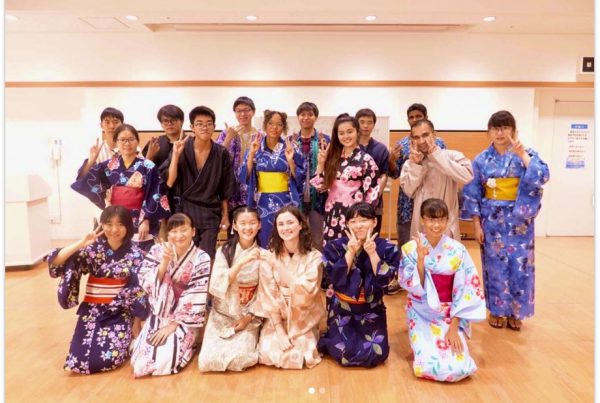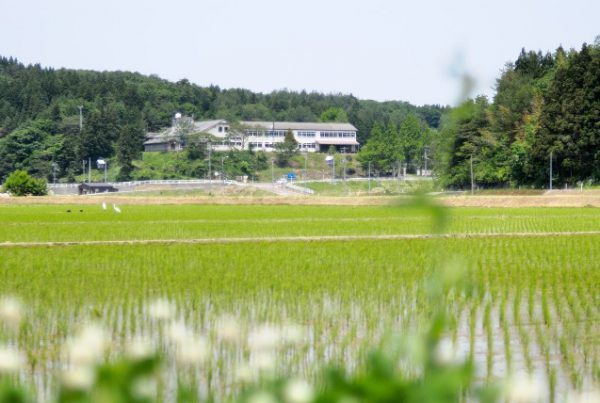English is the lingua franca of the world, and it is not an exception in Japan. Much effort has been put into place to prepare the Japanese to face and thrive in a globally connected world. A main contributor to this initiative is none other than English language professors at the university.
The Nagaoka Review team had the pleasure of speaking to Associate Professor Brian Drier from the Nagaoka University of Technology on how his experiences as a teacher have shaped his life.
ML: Michelle Lim; BD: Professor Brian Drier

A New Yorker at Heart
ML: Thank you, Professor Drier, for agreeing to an interview with the Nagaoka Review.
BD: The pleasure is mine.
ML: Could you tell us more about yourself?
BD: Certainly! I was born in New York City and spent my formative years in the suburbs. My schooling life took me to many parts of New York, exploring Central New York when I was in college and moving to Western New York to pursue a degree in Law before coming full circle to get my Masters in TESOL at Teachers College, Columbia, on the Upper West Side. Basically, I did a “tour around the state of New York”.
The Move to Japan
ML: What inspired you to come to Japan?
BD: I worked as a Legal Aid attorney for 7 years, or what one might call a public defender. I had no knowledge about Japan until fate found me—in the form of a woman. I searched for some opportunities and stumbled upon the JET Program. Since I was a kid, I had thought that I would like to teach (my mother taught in the Bronx for some years), but I thought that you had to know a lot about something, and I know a little about a lot of things but not a lot about any one thing. But for the JET Program, you only needed to be a native speaker of English with a university degree, and I thought that English was one thing that I DID know a lot about.
I moved to Niigata City more than 20 years ago and taught for 3 years. Back then, we only had a maximum of 3 years in this program. But I really wanted to be in Japan. (I knew from the very first day that I wanted to stay for the full 3 years and give up my job as a lawyer: I was invited to attend a “nomikai” or drinking party and said “yes”. This led to one of my cardinal rules during those 3 years: always say yes to a nomikai!) You could call it fate or something, but I somehow impressed a teacher who saw me teach a model lesson. Long story short, she told me to consider getting a master’s degree and she would help me to look for a job at a University.
I came back to Japan in Spring of 2002, and it’s my 19th year here in Nagaoka, Japan. Japan holds a special place in my heart. It’s like, fate brought me here. And there is just this “something” that is connecting and keeping me here, something about the place and the way of being and living that is in sync with me.
By the time I retire, I will have lived in Japan for half my life. And I expect to be buried here (or, more accurately, to be cremated). This is where my life is: my house; my kids; my work; my neighbors: all of it. And now more than ever I feel grateful to be living here.
Little Enjoyments in Life
ML: What do you enjoy most in Japan?
BD: After being in Japan for about two decades, I would say that I really appreciate the peace here, especially compared with recent developments in the States. While I might prefer direct communication over what I take to be a more typically Japanese indirect style, I have come to appreciate the beauty of the Japanese approach, the absence of conflict or overt confrontation.
I live about 25 minutes on foot from the university and I really love the neighborhood, as well as my neighbors. I absolutely love how much I feel I am accepted and included by my kind neighbors.
Living in Japan has taught me to appreciate the Onsen (hot springs) as well as the coffee shops. I often go to Izakaya— sometimes with friends, including new drinking acquaintances, but often alone–for some good ol’ sake (rice wine). What can I say? I am a sake fiend! All these have become a big part of leisure life for me.
Also, with Japan’s version of socialized medicine, it is inexpensive and relatively easy to gain access to healthcare. I have consistently been experiencing positive contact with the healthcare professionals, and I am very happy about it.
Japan has also taught me to further appreciate the seasons, culture, and tradition. The peace that exudes from the well-kept temples and shrines, as well as the high acceptance of everything including spirituality and religion. Growing up Jewish might have had a profound impact on me, but I agree that everything has some value and merit. Peace is a great path for us to be on.
Of Cultural Differences
ML: Experiencing a culture that is dramatically different from what you are used to must have been tough. What did you learn from this experience?
BD: Living in a culture that is different from what you are used to is bound to be difficult at first. It can be frustrating, but at the same time entertaining if you have patience. There is so much one can learn about living in a culture outside of one’s own. (Sometimes I notice people I knew from high school on Facebook, and they’re still living in the same town! It’s hard for me to believe.) I would highly recommend that people get out into the world and have fun. One of my favorite examples is this: Have you ever seen children cleaning their classroom? This is something that is taken for granted in Japan, but which I never saw in the States, all children doing their part to ensure the cleanliness of the space they occupy. I have a great deal of respect for the culture and the wisdom behind the traditions and way of living.
When speaking to people about their challenges of being in Japan, often we hear people sharing their frustration of not being corrected when they make a mistake in Japan. I had the same thoughts too, wondering why people never told me to my face if I did something wrong. Some people might think of it as being malicious, thinking someone is lying to them. But in Japan, I see this approach more as a way to maintain harmony—the cherished “wa” (和)—and let people save face. I learned how to roll with that and funnily, I am starting to accidentally dispense some advice to others, like an old hand!
Seeing from a Different Perspective
ML: Tell us more about your experience of seeing things from a different perspective.
BD: I think I have a good story to share…
I finished my master’s program in August of 2001. In September, I took a trip before returning to Japan, starting with an Amtrak bus that traveled from coast to coast in 3 days. I spent some time in San Francisco and camped in Yosemite National Park a little. Fast forward a few days later, I was at a youth hostel in Frankfurt, coming back from a very relaxing and satisfying day out and wondering what was happening when people were crowding around the television. It looked like a scene from an action movie…
We would later learn what happened on September 11th.
There were mixed emotions. Some people were crying for the unnecessary loss of lives, while others were angrily discussing about the intentions of the perpetrators. An Australian muttered something along the line of “serves them right”, and it was then it hit me – not everyone thinks America is the greatest country in the world…
If I had been in the US—especially in my hometown of New York–watching this news, it would have given me the “us against the world” feeling. But seeing this from the outside, it gave me a broader understanding of the differences in the world.
Now, I choose to watch Australian news (ABC) if I would like to know more about the US political scene. I find their coverage to be more holistic and insightful and less biased than the American news.
I hope to encourage my students to see from outside their perspective. This is an important theme, and as an educator it is my responsibility to share with my students and encourage them to understand the value of empathy.
Opportunities will not present themselves if we do not step outside, much like the TV at the youth hostel in Frankfurt. Having the opportunity to see from the other side could play a huge part in personal growth as it helps us to connect to different things. Imagine having better business practices, better professional and personal relationships, etc. In fact, earlier in our conversation, you referred to Design Thinking’s 5-step model in which the first step was empathy.
English as Window to the Outside World
ML: Could you give us a glimpse into a class you are teaching at the university?
BD: One of the classes I teach is called “Sogo Eigo”, or General English for the sake of simplicity.
One of the themes of the class is “The Power of Words”. In this class. students learn about different ways of expressing themselves in writing and speech. We explore that theme largely by looking at examples of powerful words in a number of speeches by public figures.
Before that, I ask my students, “What makes word powerful?”
Professor Brian Drier
When Barack Obama was elected in January of 2009, there was an article in the Japan Times. We use that as a topic and compare Japanese politicians to American politicians, how words are being used, and how the American politicians are considered by many to be more powerful and effective in their use of language.
Sometimes, I find myself being a “tour guide” to American history, politics, geography, pop-culture and more. There are many references students might not know if they are not being exposed. To understand more, and to truly appreciate the power of words in the examples I share with them, it is important to “fill in the blanks” of the history, so to speak.
In my class, a lot of reading is required. But, hopefully, the payoff is worth it. Students have the opportunity to learn about another history and culture while having their consciousness raised about techniques that can make their words more powerful.
Connecting the Dots
ML: How would you illustrate your thoughts to make it easier for students to understand better?
BD: In my class, I love using films and speeches—and occasionally music—to illustrate connections. For example, I use the movie “To Kill a Mockingbird”—a work of fiction–to illustrate the social and historical background and reality of race relations in the United States: tracing an arc from slavery to civil war through to the civil rights movement and right up to Black Lives Matter.
The film also delivers a strong message about empathy. In one scene, for example, the character Atticus Finch tells his daughter Scout about the importance of “stepping inside someone’s skin and walking around in it”. I also find speeches very powerful. We talk about Martin Luther King Jr.’s famous speech, “I have a dream” and explore how speeches force the audience to make connections.
By using the technique of indirect reference, a speaker can tap the power of words to make people think, and to share that process in the moment with all other members of the audience.
I often seem to discover connections by coincidence, and I’ve come to realize that I quickly see connections. Sometimes I suspect that this is part of the reason why I cannot always calm down.
One thing always seems to lead—and connect—to another. That’s something that I’d really like for students to absorb and take away from my class: that, and the importance of the empathy we spoke about earlier.
A theologian, Paul Tillich, once wrote that “sin is separation”. Somehow, I think that that quote is related to what I’m aiming for. By not only practicing tolerance but also aiming for empathy towards differences—in thought; culture; skin tone; sexual orientation; or anything else—we enable ourselves to connect to others and understand our shared humanity and destiny.
ML: Thank you very much for your time. We have learned so much about your experience in Japan, and we hope our readers too would enjoy the interview as much as we did. Looking forward to connecting with you again soon!













